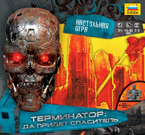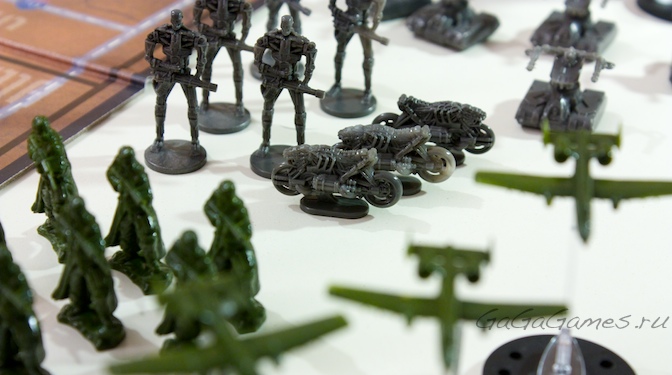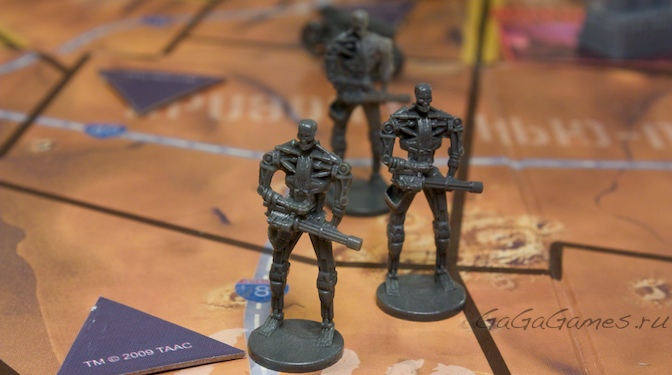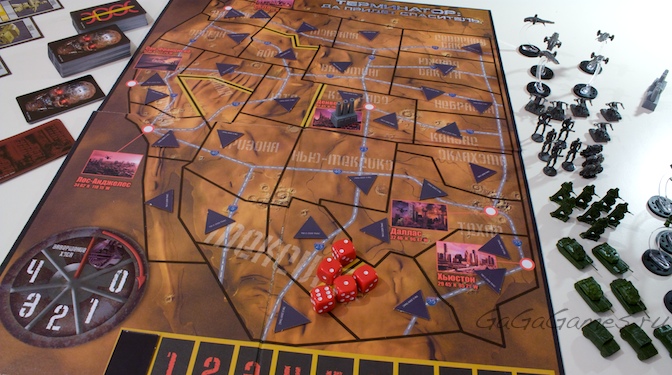Interview with the author of the board game Terminator. May the Savior Come ”by German Tikhomirov
 In 2009, the Russian company Zvezda released a board game under the license of the movie Terminator. May the savior come . ” In principle, the appearance of a board game under a well-known license is not big news - bookstores are littered with crafts about Narnia, Winnie the Pooh, Barbie, Pirates of the Caribbean and others like them, which by and large do not represent, by and large, no interest for a normal, mature, thinking person. In the case of the Terminator, however, an interesting thing came out - the game turned out to be of high quality, interesting, with excellent miniatures and nice design.
In 2009, the Russian company Zvezda released a board game under the license of the movie Terminator. May the savior come . ” In principle, the appearance of a board game under a well-known license is not big news - bookstores are littered with crafts about Narnia, Winnie the Pooh, Barbie, Pirates of the Caribbean and others like them, which by and large do not represent, by and large, no interest for a normal, mature, thinking person. In the case of the Terminator, however, an interesting thing came out - the game turned out to be of high quality, interesting, with excellent miniatures and nice design. Us ( GaGaGames) managed to talk with one of the authors of the board game “Terminator. Let the savior come ”, the person responsible for the game design (mechanics) of the game and the conversation came out very interesting. We have always been interested in the backstage of creating games - how the game is “invented”, what appears before a
GaGaGames : Please tell us a few words about yourself. What are you doing, how has fate brought you to board games, and how did you decide what your calling is to create them?
German : My name is German Tikhomirov. I am 33 years old. I live in
Among the hobbies not directly related to board games are: history, military history, fiction, role-playing games, historical reconstruction.
I play board games from early childhood. It was such simple walkers as Baron Munchausen, and a set of traditional board games, Our Toy Library. Quite early on I got acquainted with such games as go, renju, and reversi. I played chess, of course. I can’t remember exactly the moment when I decided to invent (or remake to my liking) the game myself. But there was one very bright episode.
In one of the children's popular magazines, they published the "Game in the Ships" (it seems that they were Golitsyn's "Pirates" (1)). However, I only got into the hands of the last issue, where recommendations were given for making chips. From the text one could understand the general principles of the game, but only that. And I really wanted to play (I, in addition, shortly before that, read Captain Blood's Odyssey)! Then I decided to rectify the situation by inventing this game again. A field was drawn on thick paper sheets, and chips with ship silhouettes were made from cardboard. About
GaGaGames : How long have you been developing board games? How many have been released? What do you consider your most serious success and why?
Hermann: With the advent in our country of the first board games for adults, there was a desire to try their hand again. At first it was card collectible games and processing board games that I did as a child. There was even an attempt to independently issue a card collectible game, but it failed.
For four years I have been collaborating with Zvezda. In total, at the moment, about ten of my games have been released.
It’s too early to talk about successes (apart from the success of the fact that the game you invented appeared in the stores), Terminator is the first of the released games that is designed for an adult player.

GaGaGames : Board Game Terminator. May the Savior come ”- one of the few Russian desktops that received a positive assessment from the gaming community. How long have you been working on it and what, in your opinion, is the most difficult when creating a game? Players would be interested to know how the development of the game is going on, how long the games are being tested
German : I worked on the Terminator for about two months.
Select
In general, the process of creating a game in my performance looks like this:
- The birth of the idea of the game. Most often, initially there is a technical task, consisting of the theme of the game and the age of the intended players. This is probably the most creative stage. Most often, the formation of the primary concept of the game (the plot, the main mechanics used, the form of embodiment) takes from 15 minutes to an hour. However, this is preceded by several days, and sometimes weeks of free thought on the topic of the game and the collection of information.
The complexity of this stage is self-evident. Additional problems arise with games on films and cartoons, since the entire process of developing a game occurs before they are released. I have to think not only about the game itself, but also about how much it will correspond to the original work, most of the plot moves I do not know.
- Is it possible to play this in principle? After the primary concept was born, I (most often immediately) take an ordinary notebook “in a cage” and start writing down what was born, compiling lists of elements / cards / characters / properties and the like, drawing field sketches. Having created them of this kind of game, I try, with myself, to make several moves. Often, many unaccounted moments are immediately found out. Very rarely, after this, the concept has to be redone. Most often, after several corrections and additions, I get a sketch of the game with the basic elements of mechanics and design. I’m showing everything to several people. And if their opinion coincides with mine, then I proceed to the next stage.
Here difficulties arise if the primary concept was not very bright and complete. Usually, the clearer the image of the game is born, the simpler all its subsequent creation (at least, the number of alterations is less).
- What will it be? Next, I proceed to make the layout of the game. Typically, a field, cards are printed on the printer, suitable chips, markers and other elements of which the game will consist are selected.
Something is painted with pencils or felt-tip pens,something is cut out of thick cardboard. A preliminary version of the rules is being written.
Here the complexity is purely mechanical, the more components in the game - the more time is required for their manufacture. Any player who uses card protectors will be able to imagine what it is to shoveone and a half to two hundred cards into the pockets , and yet they still need to be cut. Moreover, in the future, these cards may change, and the whole process will be repeated first with a frequency oftwo or three test batches.
- How to play this? Actually, the first testing begins. Sometimes I am with myself, sometimes the first trial games are played with other players. The rules, components and even tasks of the game can change at this stage right during the game.
The complexity here is the same as in the previous step. In addition, a lot of attention is required, so when playing, you need to think not only (and not so much) about the victory, but also about the fact that the game requires changes, constantly reconstructing yourself to new points in the rules, thinking at once for several sides.
- Is it worth it to play? After the game takes a
more or less complete form, its main testing begins. Familiar players are invited and full-fledged games are played. At the same time, I try not to tell the rules myself, but to give them to the players to read, to check the correctness and completeness of their compilation.
The difficulty here is the need to spend a lot of time and attract many different people. In addition, you regularly have to return to the previous stages, figuring outsomething in the game requires rework.
Testing time can be very different. This mainly depends on the complexity of the game and the number of improvements that occur in the process. Most often for children's games I play from 10 to 20 games. Testing the Terminator took most of the time it was created.
All of the above applies only to that part of the work on the game that I spend. Next, the large and complex process of creating the design of the game, graphics, layout and so on begins, but those who are directly involved in this will be better informed.

GaGaGames : Which board games do you prefer to play? Do you play your own developments?
German : I play a wide variety of games, but I prefer the strategy of "light" and "medium" weight. Among the most beloved: Wings of War, Memoirs of the
And with my own games the situation is funny. In fact, you begin to invent your own games precisely with the motivation to make a game that you want to play yourself. At least I started with this. But it turned out that now it’s work, and most of the games I make not to my taste, but to order. Naturally, I try not to make interesting games, but most of them are focused on children, both in terms of topics and complexity of the rules.
There are several unreleased games that I sometimes play. But the lack of a high-quality publication interferes here, since the
By the way, I play Terminator with pleasure.
GaGaGames :In your opinion, what is the reason for the lack of high-quality Russian-made and authorship planks? What do you think should be done to rectify the situation?
German : In my opinion, this is due to the fact that it’s easy to come up with a game, but the complexity of creating a really good game is very great.
To all the problems described above, two more should be added: that the game was good, not only that it would just play, and there were no "holes" in the rules. It is necessary that a certain chip was present in the game, for the sake of which the players would play this game, and not another similar to it. At the same time, the author of the game is not able to appreciate this, if his close friends are happy to play his game - this does not mean at all that the people completely unfamiliar to the author will receive the same pleasure.
The second problem is not to allow yourself to fool around. Most of all this is manifested in the time spent on testing and proofreading the rules.
To all this, it should be added that a good game requires both good design and a quality publication.
Localization of the game requires only its translation (and often only a booklet of rules and names) and printing costs (which is often done in the same printing houses as the original). Moreover, the quality of the game itself has already been tested by time.
It is no secret that until very recently board games (except chess and playing cards) in our country were considered exclusively children's entertainment. As a result, the creation of games was started by amateurs, people who have desires, much more than skills. Of course, from nothing - it just can’t turn out well at once, and the first domestic games were mostly failures. However, this is a necessary stage, without which the transition to creating good games is impossible.
I believe that the situation will inevitably change for the better.

GaGaGames : Your wishes to all players and people who are still unfamiliar with the world of board games.
German : I would like to wish those who play new interesting games, and those who have not yet, to discover the wonderful world of board games.
GaGaGames : Traditional Question - What are your creative plans for the future?
German : The plans are simple - make new games.
GaGaGames : Maybe
German : I would like to express my deep gratitude to all those people who, one way or another, contributed to my development as an author of games.
This is, first of all, my father and elder brother, thanks to whom I became interested in board games.
These are Zvezda employees, thanks to which I was able to realize myself as an author.
And finally, these are all those people who surround me, and who patiently play what I invent.
GaGaGames : Herman, thank you very much for the interview and for the great game!
(1) - “Pirates” - a board game invented by Vladimir Mikhailovich Golitsyn in 1931. The history of the game can be found here.
